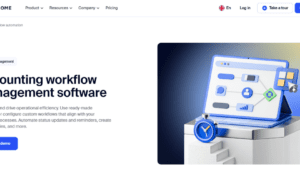Maintaining the highest standards takes time to attain in the competitive environment of the financial industry, where rules regulate all processes. To satisfy compliance rules set in place, workflow automation ensures banks build various customized solutions that optimize operations and gain the agility to respond quickly to customer expectations.
Workflow automation has emerged as a critical tool in the financial industry. In today’s fast-paced world, the industry constantly looks for ways to improve efficiency, reduce costs, and streamline operational processes.
By introducing automation in the banking process, financial institutions can execute and track methods of KYC checks, lending, and payments with resilience and adhere to compliance even during market changes. Since financial industries provide a multitude of services as every transaction and process has to be tracked, executed, and recorded. With workflow automation, banks can process consistency by compiling the information and constructing the data, no matter how complex the task is. In addition, they can leverage the benefits of workflow automation by implementing workflow automation solutions tailored to their specific needs.
Let’s check out how this software streamlines operational processes in the financial industry:
- Customer Service
The workflow automation software helps a bank deal with customer services through chatbots. As the banks have to deal with multiple situations in customer services ranging from queries to support to account opening or loan processing tasks, this automation system verifies the data available in the bank database and fetches details based on the queries. Therefore, this approach plays a vital role in improving customer relations.
- KYC Process
Workflow automation resolves the manual tasks involved in the customer KYC process that exists in every bank. It automates all client data collection, screening, or processing of the data, enabling approval and validation. Thus, the financial sector has increased its productivity by reducing manual tasks with the help of workflow automation.
- Accounts Payable
With workflow automation solution, financial institutions are building dedicated applications to meet customer needs. For example, digitizing invoices from vendors through OCR is a tedious process that can be established and streamlined through workflow automation.
- Lending & Payments
Moreover, with the help of workflow automation software in banks, it can eliminate the risks involved in complex scenarios such as loan processing and credit card distribution and thus automate the execution of unstructured payments.
- Card Management
Financial institutions like banks have to handle repetitive processes related to the credit card or debit card requests. Workflow automation enables employees to manage card processing, billing, replacement, or blocking processes. It ensures the customers receive a great experience and reduces employees’ workload, attention, and time handling these card operations.
- Client Lifecycle Management
For any financial organization managing and maintaining their client data is paramount. Implementing a workflow automation system allows employees to diligently and periodically work on everything related to their clients. Ranging from KYC checks, account opening, client onboarding, loan processing, or card management, institutions can understand their clients in a better way and even support them in their needs.
- Governance, Risk & Compliance
The workflow automation system can simplify compliance and governance of financial organizations. It can eliminate errors, avoid reputational damage, and protect from financial losses. Institutions can seamlessly comply with regulatory requirements while maintaining legal observance of the latest regulations and ensuring that data is consistent and accurate.
- Operational Excellence
To achieve operational excellence, departments can quickly implement customized, flexible solutions for front-to-back-office coordination and optimize it for maximum efficiency. From real-time messaging to creative work assignments, workflow automation solutions can enable communication tools for the accounting sector that can streamline the internal processes for conversational banking.
- Better Customer Service
Workflow automation can help financial institutions to provide better customer service. By reducing the time required to complete a process, improving accuracy, and enhancing collaboration, workflow automation can lead to faster processing times and a better customer experience.
- Reduced Costs
Workflow automation can reduce costs in the financial industry. By automating tasks, eliminating the need for manual intervention, and reducing the likelihood of errors, workflow automation can help financial institutions to save time and money.
Conclusion:
As we saw above, how workflow automation helps streamline operational processes, reduce costs, improve efficiency, and enhance customer service, can be a game-changer for the financial industry. It can improve accuracy, reduce the time required to complete a process, and provide a competitive advantage to institutions in enhancing their services. Thus implement this automation within your financial setups and ensure the methods and systems across your business landscape are fully connected to transform how you reach clients.

































